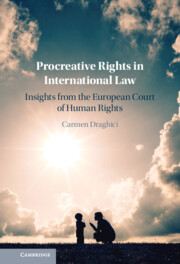Book contents
- Procreative Rights in International Law
- Procreative Rights in International Law
- Copyright page
- Dedication
- Contents
- Table of International Cases
- Table of International Instruments
- Introduction
- 1 Parenthood Aspirations and Justiciable Rights
- 2 A Right to a Genetically Related Child?
- 3 A Right to the Recognition of Intentional Parenthood?
- 4 A Right to a Healthy Child?
- 5 The Quest for Reproductive Equality
- Conclusions
- Select Bibliography
- Index
3 - A Right to the Recognition of Intentional Parenthood?
Published online by Cambridge University Press: 26 April 2024
- Procreative Rights in International Law
- Procreative Rights in International Law
- Copyright page
- Dedication
- Contents
- Table of International Cases
- Table of International Instruments
- Introduction
- 1 Parenthood Aspirations and Justiciable Rights
- 2 A Right to a Genetically Related Child?
- 3 A Right to the Recognition of Intentional Parenthood?
- 4 A Right to a Healthy Child?
- 5 The Quest for Reproductive Equality
- Conclusions
- Select Bibliography
- Index
Summary
Chapter 3 argues that intention-based parenthood has started to acquire relevance in donor insemination and foreign surrogacy case law. The Strasbourg Court has recognised the right of surrogate-born children to establish legal ties expeditiously with their non-genetic intended parent. The latter is an incidental beneficiary, as his/her own right to respect for the parental project/de facto care of the child is outweighed by public interests. However, intentional parenthood is parasitic on marriage to the child’s genetic parent, and hence vulnerable in case of relationship breakdown. The chapter further discusses the different approach to intentional parenthood in donor insemination cases: by contrast with cross-border surrogacy situations, the Court only requires measures safeguarding the de facto ties between children and their social parents (not parental status). Surrogacy cases where neither intended parents is related to the child do not attract an obligation to establish legal affiliation, insofar as the child’s identity is defined by genetic heritage.
Keywords
- Type
- Chapter
- Information
- Procreative Rights in International LawInsights from the European Court of Human Rights, pp. 110 - 167Publisher: Cambridge University PressPrint publication year: 2024

